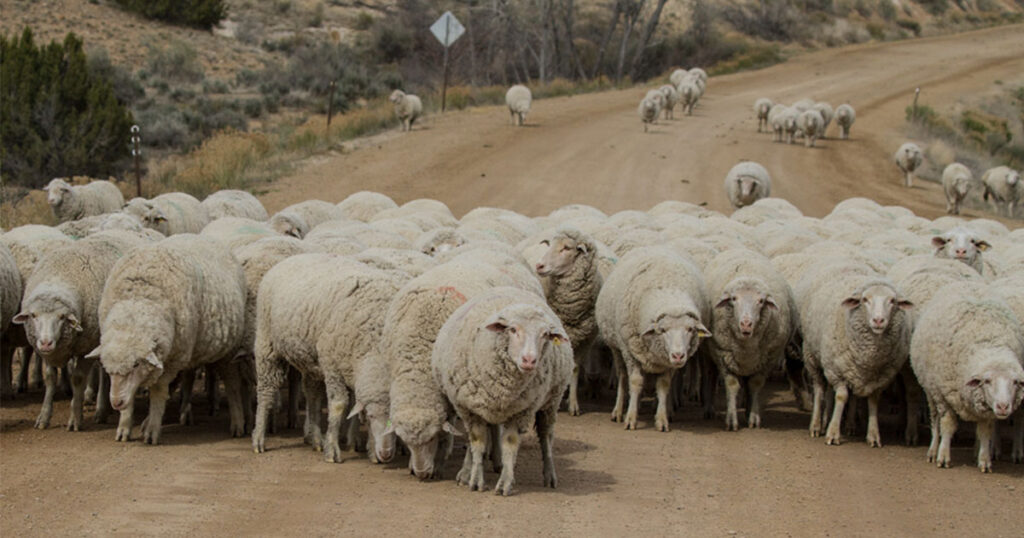
“I am two fools, I know / For loving and for saying so,” writes John Donne in “The Triple Fool.” But what’s foolish about admitting what is obvious? Only if his love were mild, small, or secretive could proclaiming it change a thing by yanking it from cover into the center of the circle. Is love often small? An invisible bird with a single note, balanced on a far tree branch before it flutters off? Is love a mouse, content with crumbs? No. Love is not a quiet animal. It leaps about like a goat in a pen, all sharp hooves and flat eyes and sonorous bleats. Even more than a single animal, love is a small stampede, dust in the air, difficulty breathing, a cliff edge on the left, a box canyon on the right, danger everywhere. It is a river jumping its banks and tearing out watching trees as it does. Love is blind, so blind, and has no easy escape. Love does not hide, love dies. But first, before the end, is the hope of civility, calm. Says Donne of love, “He tames it, that fetters it in verse.”
But why, I wondered, should that be? Does rhyme stymie the emotion? Rhyme and meter, standards of Donne’s poetry, are restrictions like the chutes and gates in a corral, and we with our emotions, the crazed herd. Crash! Love collides and takes a tumble. Bang! Down goes admiration, knocked aside and ricocheting off the fence. Around and around go the emotions, scary but fun for onlookers. What a circus. “I am two fools, I know / For feeling and for showing so.”
In films and on the page I have witnessed a cattle stampede, but in real life I’ve never seen one. I’ve never been close to a herd. But in early September while I was visiting my mother in Magdalena, New Mexico, she and I drove one morning to a ranch just west of town to see how herding dogs work a flock of sheep. The owner of the ranch had two big blond guard dogs, Emma and Thor, one pure Maremma and the other Great Pyrenees crossed with Anatolian. They stayed with the flock day in and day out. The two collies, Finn and Blake, moved the flock between the corral, pens, and fields. When my mother and I parked the car by the pens, the guard dogs watched us from within. Pete, the rancher, and his two collies drove down from the house on the hill. Sure, he told us, we could pet Emma and Thor, and we could try to pet Finn, but she’s not very sociable. Sure enough, the collie had eyes only for Pete, and sat at his feet, staring up at him. He was tall, lean, and handsome.
Pete began by opening the gate to the corral where the sheep were bunched and sending Finn in for them. He gave a few commands—there, lie down, come—and the collie stopped, started, and turned according to his directions, moving the sheep from the corral and into the fenced field. Pete explained the pressure on the sheep from the dog, the fence, and the open acres of grassland for grazing. My mother and I stood behind another gate and watched as the dog moved the herd around the field. This was all very exciting. I was thrilled. Pete explained what he was telling the dog to do, what the dog was doing well, and where she was falling short. After a while, he put her into the pickup and let out the other dog, one and a half years old and in training, for a turn. Different performance, same effect on the sheep, namely fear and agitation. How interesting, I thought, that the sheep knew the difference between the dogs that were their protectors, whom they largely ignored, and the ones that acted like predators, circling, heads low, snouts long, creeping forward, hunkering down, then rushing toward the sheep until a word from Pete stopped them.
Later, watching the video I’d made of the dogs at work, I was surprised to find that what stood out more than anything—more than the rancher’s command of the dogs, the dogs’ eagerness to work, or the pressure on the sheep—were my mother’s and my enthusiastic responses to the man’s explanations. “Ah!” and “Wow!” and “Oh, yes!” and “I see,” my mother and I intoned, over and over. It was nearly a ritual, a chorus, made up of variations on wonder and appreciation as the sheep went running from one end of the field to the other, then back through the gate into the corral.
Finally, after both collies had had their turn, Pete had Finn go in for the sheep, this time to take them into open acres of his ranch. My mother and I watched, uncertain where the sheep were headed until, in surprise, we saw they were surging toward us. We pressed back against a fence as the herd came galloping past, a mass of dirty white backs, skinny legs, flopping ears. They moved as one, as water does, with breaks in the surface when one sheep or another rose up onto the back of the animal in front of it, some leaping, some tucking their heads. It was a joyful commotion. In this instance, it was not the excited creatures turning and twisting under the pressures of the dog, the fence, the rancher, the desire for food, the warming day—all those warring wants and fears—but the two witnesses to the headlong rush who were the two fools. That’s what we sounded like, with our gasps and chortles and exclamations, all gladness and delight. But how foolish is it to admire? To esteem? To adore? To love? That day, it was pure fun.

